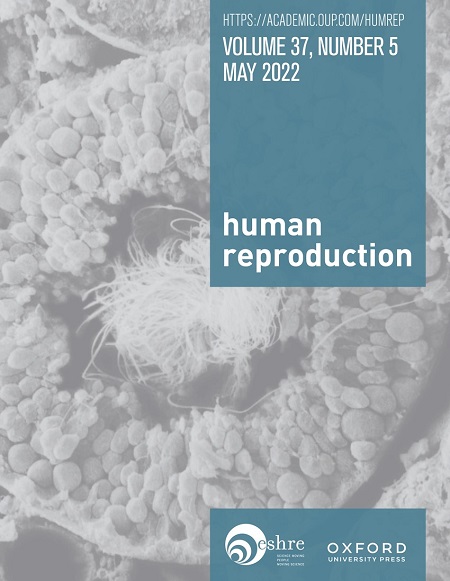Validity of administrative health data case definitions for identifying polycystic ovary syndrome: a systematic review and meta-analysis
IF 6
1区 医学
Q1 OBSTETRICS & GYNECOLOGY
引用次数: 0
Abstract
STUDY QUESTION What is the validity of published administrative health data case definitions of polycystic ovary syndrome (PCOS) compared with reference standards? SUMMARY ANSWER Due to the limited number of eligible studies, drawing definitive conclusions is challenging; however, this review highlights significant gaps and variability in current PCOS case definitions, underscoring the need for standardized case definitions in future research. WHAT IS KNOWN ALREADY Administrative health data offer the opportunity to evaluate health outcomes and disease epidemiology at a population-level. Currently, the validity of existing administrative health data case definitions for PCOS is unknown. STUDY DESIGN, SIZE, DURATION A systematic review of the literature was conducted on full-text English-language articles up to July 2023, using the MEDLINE and EMBASE databases. PARTICIPANTS/MATERIALS, SETTING, METHODS Two reviewers independently screened titles, abstracts and full texts, extracted data, assessed study quality and graded validity. A random effects meta-analysis was conducted to pool reported validity measures and heterogeneity was examined. MAIN RESULTS AND THE ROLE OF CHANCE The review included four eligible articles consisting of three cross-sectional studies and one retrospective cohort study. Two studies defined PCOS using the Rotterdam Criteria, one study used self-report, and one used a clinical gold standard. All case definitions included the International Classification of Diseases (ICD)-9 code 256.4 for ‘polycystic ovaries’ and three studies used E28.2 for ‘polycystic ovarian syndrome’. Three studies reported positive predictive value (PPV), which ranged from 30 to 96%. One study reported both PPV (96%) and sensitivity (50%) for one case definition. The pooled PPV estimate for the ICD code-based case definitions was 88% (95% confidence interval 82-95%; I2 = 100%). One study reported fair agreement (percent agreement= 90.3, κ = 0.27, percent agreement bias adjusted κ = 0.81). Overall, the risk of bias of the included studies was low. LIMITATIONS, REASONS FOR CAUTION There were limited number of validations and precision indices of validations. WIDER IMPLICATIONS OF THE FINDINGS Further validation of these case definitions in other administrative health datasets, and development of novel coding algorithms is required to inform future population-based studies in PCOS. STUDY FUNDING/COMPETING INTEREST(S) No external funding was used and there are no disclosures. REGISTRATION NUMBER PROSPERO CRD42023385617鉴别多囊卵巢综合征的行政卫生数据病例定义的有效性:系统回顾和荟萃分析
研究问题:与参考标准相比,已公布的多囊卵巢综合征(PCOS)行政卫生数据病例定义的有效性如何?由于符合条件的研究数量有限,得出明确的结论是具有挑战性的;然而,这篇综述强调了目前多囊卵巢综合征病例定义的重大差距和可变性,强调了在未来研究中标准化病例定义的必要性。行政卫生数据提供了在人口水平上评估健康结果和疾病流行病学的机会。目前,PCOS的现有管理健康数据病例定义的有效性尚不清楚。使用MEDLINE和EMBASE数据库,对截至2023年7月的英文全文文献进行系统综述。两名审稿人独立筛选标题、摘要和全文,提取数据,评估研究质量和效度分级。随机效应荟萃分析汇集报告的效度测量并检验异质性。主要结果和偶然性的作用本综述纳入了4篇符合条件的文章,包括3篇横断面研究和1篇回顾性队列研究。两项研究使用鹿特丹标准定义多囊卵巢综合征,一项研究使用自我报告,另一项使用临床金标准。所有病例定义均采用国际疾病分类(ICD)-9代码256.4表示“多囊卵巢”,三项研究使用E28.2表示“多囊卵巢综合征”。三项研究报告了阳性预测值(PPV),范围从30%到96%。一项研究报告了一个病例定义的PPV(96%)和敏感性(50%)。基于ICD代码的病例定义的合并PPV估计值为88%(95%置信区间为82-95%;I2 = 100%)。一项研究报告了公平一致性(一致性百分比= 90.3,κ = 0.27,一致性偏差调整后κ = 0.81)。总体而言,纳入研究的偏倚风险较低。局限性、注意原因验证的数量有限,验证的精度指标也有限。研究结果的更广泛意义需要在其他行政卫生数据集中进一步验证这些病例定义,并开发新的编码算法,以便为未来基于人群的PCOS研究提供信息。研究资金/竞争利益(S)没有使用外部资金,也没有披露。注册号prospero crd42023385617
本文章由计算机程序翻译,如有差异,请以英文原文为准。
求助全文
约1分钟内获得全文
求助全文
来源期刊

Human reproduction
医学-妇产科学
CiteScore
10.90
自引率
6.60%
发文量
1369
审稿时长
1 months
期刊介绍:
Human Reproduction features full-length, peer-reviewed papers reporting original research, concise clinical case reports, as well as opinions and debates on topical issues.
Papers published cover the clinical science and medical aspects of reproductive physiology, pathology and endocrinology; including andrology, gonad function, gametogenesis, fertilization, embryo development, implantation, early pregnancy, genetics, genetic diagnosis, oncology, infectious disease, surgery, contraception, infertility treatment, psychology, ethics and social issues.
 求助内容:
求助内容: 应助结果提醒方式:
应助结果提醒方式:


